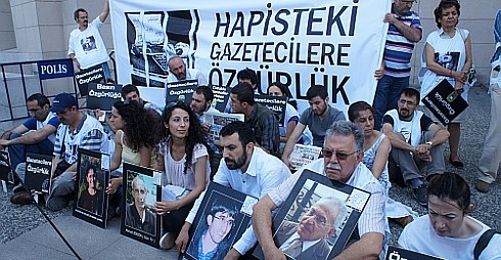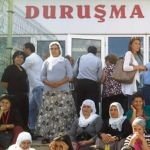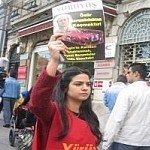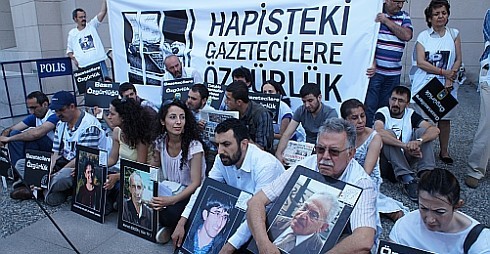
Turkish authorities Monday released Abdülmenaf Düzenci, the publisher of the Yüksekova Gündem news website and the general manager of the Hakkarinews website who had been arrested 17 months ago within the scope of the probe into the Kurdistan Communities Union / Turkey Council (KCK/TM.)
The decision marks the first such occasion that authorities released a journalist following the ratification of the Third Judicial Package which entered into force on July 5.
Law enforcement officials had taken Düzenci under custody in the district of Yüksekova in the southeastern province of Hakkari and later arrested him on March 15, 2011. Authorities released Düzenci along with nine other suspects on Monday but also ruled to keep five other suspects behind bars. Abdülmenaf Düzenci's son Musa Düzenci notified bianet about his father's release.
Düzenci and the 14 other suspects who were arrested along with him requested their release after the judicial reform package came into force.
The replacement of the 109th article of the Code of Criminal Procedure (CMK) with the 98th article of 6352nd Law within the scope of the Third Judicial Package has led to stiffer conditions to arrest suspects. The current legislation now demands more tangible reasons to arrest suspects and to deny their requests to be released while it also promotes judicial control mechanisms.
"No real rejoice"
Abdülmenaf Düzenci said he could not rejoice in his release, however, while speaking to the website Yuksekova.com upon his discharge from prison.
"We were released with some of our friends, but we could not really feel much joy in our release. It deeply saddened me and my other friends who were discharged [from prison] that many of our friends remained under arrest and that they forced themselves to look cheerful while casting woeful looks behind us. It does not please us to be out of prison. When all our friends come out [of prison] and return back home, that is when we will truly rejoice. We wish for all our imprisoned friends to regain their freedom. I greet all the people of Gever," Düzenci said.
Authorities first placed Düzenci in an F-Type Prison in the eastern province of Van, but following last year's devastating earthquakes in the area, they then transferred him to an E-Type Prison in the northern province of Amasya. Düzenci was finally sent back to the prison in Van last month.
Among the suspects arrested under the KCK file and released pending trial on Monday were Metin Yaşar, Emin Seven, Abdülkerim Akdoğan and Yılmaz Güneyli from the Van F-Type Closed Prison, Nahide Yıldız from the Bitlis Prison in the country's southeast and Yılmaz Gözyan from a prison in the eastern province of Muş, while authorities also released Remziye Yaşar and Songül Öğmen as well.
Düzenci in retrospect
Abdülmenaf Düzenci was born in Hakkari's Yüksekova district in 1963. He started his career in journalism in 2008. Officials then arrested him on March 15, 2011 within the scope of the KCK investigation.
"We believe our esteemed general manager who only occupied himself with his [journalistic] duties has been arrested unjustly and against due procedures and the law. His job is merely to inform the public. For that reason, he made a [number] of phone calls intended to gather information. Accusing him in relation to his efforts to gather reliable information by interviewing people from all backgrounds in accordance with his duties [as a journalist] is not ethical. Therefore, as members of the press we await and wish for the release of our general manager as soon as possible and for him to resume his duties," employees of the Hakkarinews website had said in a press release following Düzce's arrest.
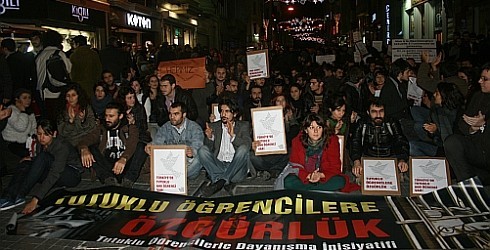
14 students come out of jail
Meanwhile, authorities also released another 12 students in Istanbul and two more students in the northwestern province of Kocaeli in accordance with the amendments that came into effect as part of the Third Judicial Package.
The students had been arrested pending trial on the charge they were members of the Democratic Patriotic Youth (DYG.)
Some 771 mostly Kurdish students were under arrest in prisons across Turkey prior to the decision, according to a report by the İnitiative for Solidarity with Arrested Students (TÖDİ.)
"The release of two [convicts] who had murdered seven members of the Turkey Workers' Party (TİP) startled everyone, and we were at a loss over what to think. The students' release, however, is extremely pleasing, and we hope it will also serve as a precedent for other arrested students," said Deniz Gedikli, a legal expert from TÖDİ.
The 12 students in Istanbul had been under arrest for 14 months.
Authorities consequently released Şafi Onat, Volkan Boyraz, Tuğba Kahraman, Hamza Kurt, Sezar Duruk, Kahır Karasaç, Cihan Dara, Fırat Baran, Adem Şahin, Yılmaz Sarı, Abdulkahar Karasaç and Ahmet Çoban within the scope of the Third Judicial Package on Tuesday.
The 12 students were among a total of 19 detained by law enforcement officials after a raid on May 17, 2011 and who were later arrested. Another suspect arrested pending trial was also added into the file in which some 30 people faced charges in all.
The indictment against the students included a number of alleged offenses, such as unfurling a banner demanding free education, selling free concert tickets, issuing a press release in support of workers of TEKEL (the former state monopoly holder over the sale of alcoholic beverages and tobacco products,) and partaking in a string of demonstrations including the May 1st Workers' Day, March 8th World Women Workers' Day and the Newroz celebrations.
No release for Oda TV suspects
The Istanbul 16th Court for Serious Crimes also rejected a request by Oda TV suspects for their release in accordance with the new amendments that came into force with the ratification of the Third Judicial Package.
Soner Yalçın, Yalçın Küçük, Barış Terkoğlu, Barış Pehlivan and Hanefi Avcı requested their release on the grounds that the Third Judicial Package had abolished the upper limit of three years for judicial control.
The court rejected their demands, however, arguing there were facts indicating strong suspicion of a criminal offense.
The court also said the expert report from the Scientific and Technical Research Council of Turkey (TÜBİTAK) had not yet arrived and thus the application of protective measures would be insufficient. (EÖ / NV /EKN)






